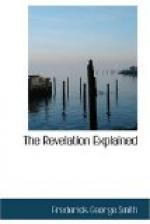These are the great principles corrupted by the Papacy. Instead of the one supreme God, we find another in the temple of God, “showing himself that he is God.” Christ was not recognized as the supreme and only head of the church; but instead the Pope claimed the title of universal head and legislated supreme, while his decrees and anathemas were accepted as from Jehovah himself. Christ was not regarded as the only mediator between God and man, but the virgin Mary and the saints were exalted to share the mediatorial throne, the mother being more honored than the Son. Penance, counting of beads, works of supererogation, were believed to be more effectual in obtaining forgiveness of sin than living faith in our only Redeemer. Finally, in place of the humble ministers of Christ whom he appointed to officiate in his church, there were haughty lords and rulers, making the most extravagant claims to power and authority over the minds and consciences of men. The court of the temple was the space outside of the sanctuary occupied by the congregation while the worship within was conducted by the priests. John was told to leave this out and measure it not; for it was given to the Gentiles to tread under foot, or profane, for the space of forty and two months, or twelve hundred and sixty days. In the estimation of a Jew, the Gentiles were all idolaters and outside of God’s covenant favor. As a symbol, then, we are to understand that the great body of worshipers thus brought to view are not the true children of God at all, but are, as it were, uncircumcised, idolatrous Gentiles, having no connection whatever with the great head of the church and no part in the covenant of his mercy. The whole city of Jerusalem was to be given over to this profane multitude and by them desecrated for forty-two months, denoting that this great company of worshipers was to constitute the visible, external church during the period specified. It is as though the city of Jerusalem were occupied by the idolatrous heathen, and the Jews driven out as aliens. These Gentiles, then, were to constitute the one great (so-called) universal church—the Church of Rome.
Forty and two months, or twelve hundred and sixty days, are symbolic time, signifying twelve hundred and sixty years, during which time the power of apostasy was to reign supreme over the minds of men. The same period is also referred to frequently in subsequent chapters. It is necessary, then, for us to ascertain at what period of time the church was given over to a profane multitude that was not the true people of God. Some have supposed that this must refer to the time when Popery became fully established. Such, however, could not be the case (although the time-period includes that important event); for the power of apostasy was greatly developed centuries before the final supremacy of the Popes was established, and was necessary in order to prepare the way for their exaltation. The Popes obtained their authority




